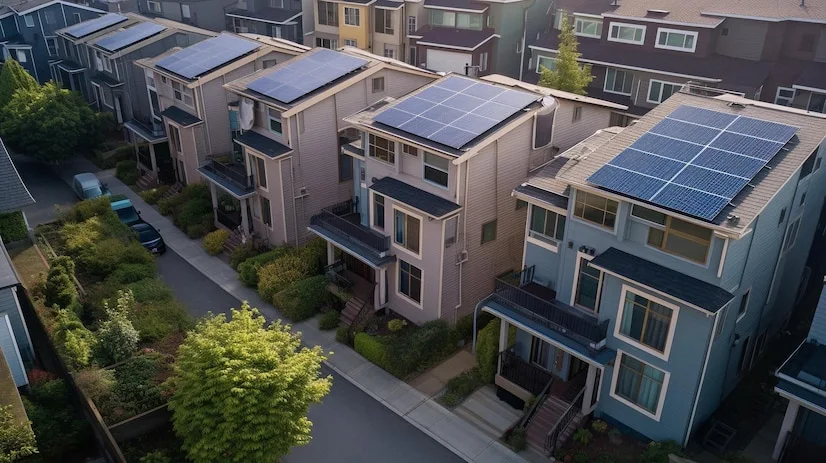Can You Put Solar Panels On A Townhouse?
Town house communities typically impose strict property-use regulations, posing potential challenges for owners interested in adopting solar energy. Unlike standalone houses, townhouse owners may encounter more complexity in pursuing solar initiatives. Despite these hurdles, most townhouse owners can successfully navigate and address these challenges. Being well-informed about potential issues is crucial before starting the solar installation process.
What are the considerations before installing solar panels on townhouses?

“The number one challenge with going solar on townhouses is roof space,” said Francis Bebla, sales manager at GC Electric Solar, a solar installer in southern California.
In comparison to standalone houses, townhouses typically provide a smaller amount of roof space for solar panels. The solar panels must be sufficiently large to save energy and generate income for the townhouse owner. The larger the townhouse’s energy needs, the more extensive the solar power system is required for economics to be viable. Obtaining quotes from at least three solar installers is advisable to assess potential returns accurately.
The 2018 International Fire Code says there must be a 3-foot pathway from the roof edge to the top. Depending on the array size, there also needs to be a setback of 18-36 inches from the top.
Many townhouses require flat roofs to tilt solar panels for optimal sunlight. You must space the panels two feet apart to avoid shading and ensure they work well. This limits space for panels on the roof.
Most townhouses have enough roof space for solar panels despite potential challenges. They use less energy, making it easier to offset their energy usage with a solar panel system.
Electrical Wiring
The wiring for the solar panel system could be the cause of a problem with townhouses. In a single-family home, the wiring is straightforward. Solar panels on the roof connect to the house’s electrical panel. The line then proceeds to the home’s electrical meter, typically nearby.
As a result, electrical lines often need to be run from the solar array to the subpanels in townhouses. Townhouses have small electrical panels located away from the main panel in less convenient spots. Subsequently, the electrical line must extend to the townhouse community’s electric meter, usually in a different location.
Townhouses often have more complex electrical systems, leading to higher electricity costs than standalone homes. Be careful of cheaper quotes, which may not include extra electrical costs.
Can You Put Solar Panels On Townhouse in California?
We can start the project after you tell the HOA about our warranty. HOAs are usually not a significant issue in California because of the state’s solar access law.
There might be minor requirements, like painting the conduit to match the building’s sides. The owner must pay a fee and apply to the HOA with the system design and roof panel locations. Following this, there might be a wait until the next HOA board meeting for the application review, which could take a few months.
After this process, you and your home will be all set to enjoy the benefits of solar energy.
Advantages of Solar Panels for Townhouses
Solar panels offer numerous benefits for townhouses, including installing solar energy systems. They are crucial in low utility bills and presenting a reliable and cost-effective rooftop solar system.
Homeowners can save money and get federal tax credits by investing in solar panels. Solar panels protect against changing electricity costs, offering a reliable energy source unaffected by utility rate changes.
Various payment options for solar panels include leases and loans. These options can simplify the installation process and make it more affordable. Individuals can save money on solar panel installation by utilizing these payment methods. Townhouse residents can save money and help the environment by using clean energy for a more sustainable future.
Solar panels on roofs can work better with battery storage systems and net metering, becoming more flexible and efficient. These options help homeowners save energy and money.
Factors to Ponder on When Setting Up Solar Panels
Experienced solar installers can install solar panels on different types of roofs like flat, slate, metal, or asphalt shingles. Nonetheless, mounting solar panels on a townhouse could pose difficulties. The process becomes complicated because workers must place panels only on the roof of each unit, not on shared structures.
Townhouse roofs are typically small. This means there may be restrictions on how many solar panels one can install. These limitations can impact the amount of power that the system can produce.
Can you put solar panels on a rental property?
Yes, you can set up solar panels on a rental property. However, securing your landlord’s approval is crucial, as installing solar panels is a substantial property enhancement. Some individuals argue against making significant investments in a property you don’t own, deeming it less practical.
Townhouse roofs are typically small. This means there may be restrictions on how many solar panels one can install. These limitations can impact the amount of power that the system can produce.
Conclusion
Adding solar panels to a townhouse is a good investment. It can lower electricity bills, raise property value, and help the environment. Townhouse residents can use sustainable energy efficiency and help the environment thanks to new laws. We can still explore alternative renewable energy sources with limited space or impractical conditions.
If you need more information about the townhouse house installation Company, you can get a free estimate about how to add solar and more details about going solar we are making the switch easier.
Contact Our Friendly, Knowledgeable Staff
Solar Earth Inc., with expertise and certifications, empowers your home for enhanced energy generation. Contact us today to transform your home into a sustainable, long-term renewable energy source.
